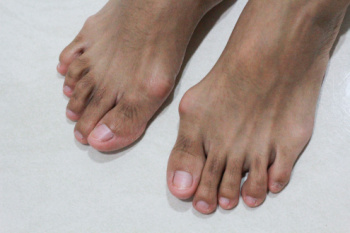
Drexel Hill (484) 521-0233
West Chester (610) 436-5883

Drexel Hill (484) 521-0233
West Chester (610) 436-5883

Bunions, characterized by bony protrusions at the base of the big toe, result from various factors like genetics, wearing tight shoes, and poor foot mechanics. They can cause discomfort and pain. Treatment for bunions typically involves wearing roomy, supportive footwear, or using orthotic inserts to improve foot alignment. Additionally, it may be beneficial to apply padding and taping for pain relief and engage in helpful exercises. For severe bunions, surgical intervention may be necessary to correct the deformity. If you are suffering from a painful bunion, it is suggested that you schedule an appointment with a podiatrist for suitable treatment based on the severity of your condition.
If you are suffering from bunions, contact the podiatrists of Dr. Siegerman & Associates. Our doctors can provide the care you need to keep you pain-free and on your feet.
What Is a Bunion?
A bunion is formed of swollen tissue or an enlargement of boney growth, usually located at the base joint of the toe that connects to the foot. The swelling occurs due to the bones in the big toe shifting inward, which impacts the other toes of the foot. This causes the area around the base of the big toe to become inflamed and painful.
Why Do Bunions Form?
Genetics – Susceptibility to bunions are often hereditary
Stress on the feet – Poorly fitted and uncomfortable footwear that places stress on feet, such as heels, can worsen existing bunions
How Are Bunions Diagnosed?
Doctors often perform two tests – blood tests and x-rays – when trying to diagnose bunions, especially in the early stages of development. Blood tests help determine if the foot pain is being caused by something else, such as arthritis, while x-rays provide a clear picture of your bone structure to your doctor.
How Are Bunions Treated?
If you have any questions, please feel free to contact one of our offices located in Drexel Hill and West Chester, PA . We offer the newest diagnostic and treatment technologies for all your foot care needs.
Request a free copy of
Laser Away Foot Pain!
today.
